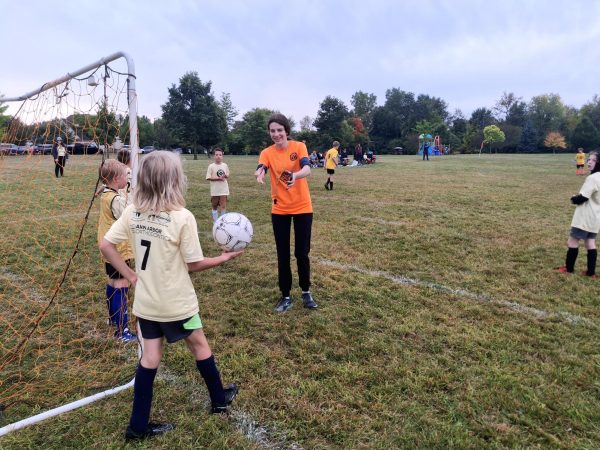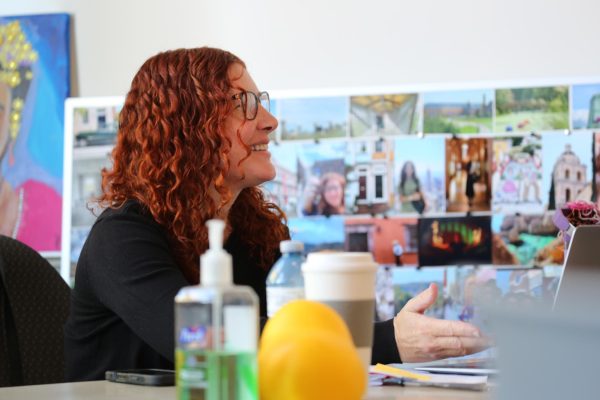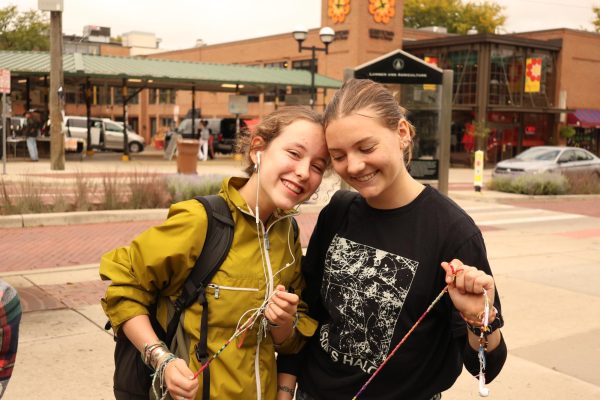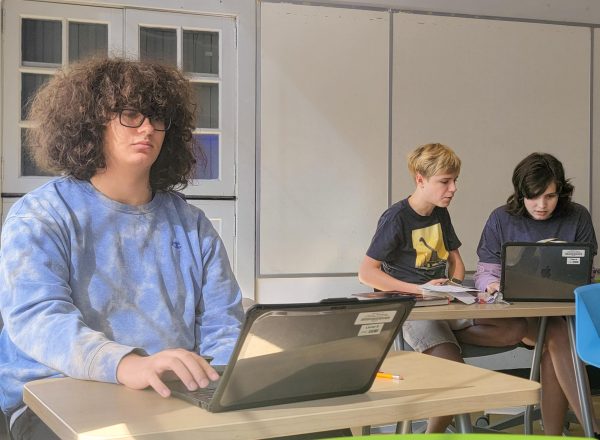The art of storytelling
Patti Wheeler’s interest in storytelling was sparked by an unimaginable loss. When she was nearly 24 years old, she returned home to find that her fiancé, Paul, had died by suicide.
“Paul made me feel like the weirdness that I was, was good,” Wheeler said.
Three weeks after his death, Wheeler began going to suicide loss survivor support groups. They helped her understand that she wasn’t alone. Other members of the group were able to articulate what Wheeler was feeling in ways she didn’t yet know how to.
“They continued to make me feel more and more normal, and more and more like my story mattered, and that my life didn’t end when Paul died,” Wheeler said.
Wheeler came to the realization that what she was connecting to in these groups were other people’s stories. In pursuing her passion for storytelling as a career, Wheeler found The Moth.
When Wheeler spoke to the creative writing class on Sept. 24, 2019, the class was working on personal narratives about important moments in their lives. Three students volunteered to discuss their stories in front of the class. Wheeler went in-depth with each student, unafraid to ask tough, personal questions. Putting themselves in vulnerable positions, the students were open with Wheeler and the rest of class.
Wheeler attended undergraduate school at Michigan State University. It was there that she got her bachelor’s degree in theatre, which she has always been passionate about. She focused specifically on production, which later became crucial to her career in storytelling. Wheeler received her Masters Degree in storytelling at East Tennessee State University. When telling the class about her Masters Degree, she joked that she often has to tell people that storytelling is, in fact, a real major.
In 1997, George Dawes Green created The Moth. Green moved from South Carolina to New York City, and he found that what he missed most was sharing stories with his friends from his old home. He decided to bring something like this to his new home, and from this The Moth was born. The name comes from the idea of moths being attracted to a flame — the same way humans are attracted to stories.
The organization began in bars as an oral story telling competition, which still occurs today. Each event has a theme: themes are words like detours, names, and traditions. Ten volunteers stand up to tell personal, five minute stories relating to the theme, and they are scored from three groups of judges in the crowd. These events are still popular, but the The Moth Radio Hour and The Moth podcast are additional short story platforms. The program spread across the U.S. and around the world, with participants from Ireland, Australia and England.
Wheeler discovered the organization in 2010 when she heard from friends that there was going to be a live show on Michigan Public Radio. Her interest was piqued; Wheeler emailed Jennifer Hickson, Senior Director of The Moth, to see if she could volunteer for the organization. She got the opportunity when the first story Grand Slam competition came to Detroit. When The Moth was brought to Ann Arbor, Wheeler signed up to help with the live show competitions. From her extensive volunteer work, Wheeler met the head producer of The Moth. When the producer decided to step down, he asked Wheeler to take over the position.
Wheeler’s background from her bachelor’s degree in theatrical production and her master’s degree in storytelling equipped her with the skill set that allowed her to excel at her new job. Wheeler is now the producer of the Michigan chapter of The Moth.
Wheeler explained that stories connect people and make our world smaller. She also pointed out that it is not just tragedy that connects people.
“There are lots of little things that we all have in common that, naming and talking about, can help strengthen our bonds,” Wheeler said.
Wheeler’s favorite part of her job is watching the faces of the audience as they connect to the storyteller. At the end of the evening, Wheeler loves seeing audience members talking to the storytellers.
“It never gets old. After almost ten years, it’s just as beautiful as the first time I saw it,” Wheeler said.
Wheeler knows how to tell a good story. She explained that at its base a story is something that has a beginning, a middle and an end. After deciding what story to tell, the key plot points have to be decided. These key points can’t change when telling the story. Enriching details are also essential. Including touch, sight, sound, and smell helps the audience visualize the story being told. It brings the story to life.
Wheeler’s biggest piece of advice is to remember that everybody knows their own story. It can be nerve-wracking to get up and tell a personal story, but nobody can tell the story better than the storyteller — not the audience, not the judges.
“When you’re telling your story, remember that you know it,” Wheeler said. “That it is your story to tell, and that your story has value and deserves to be heard.”









